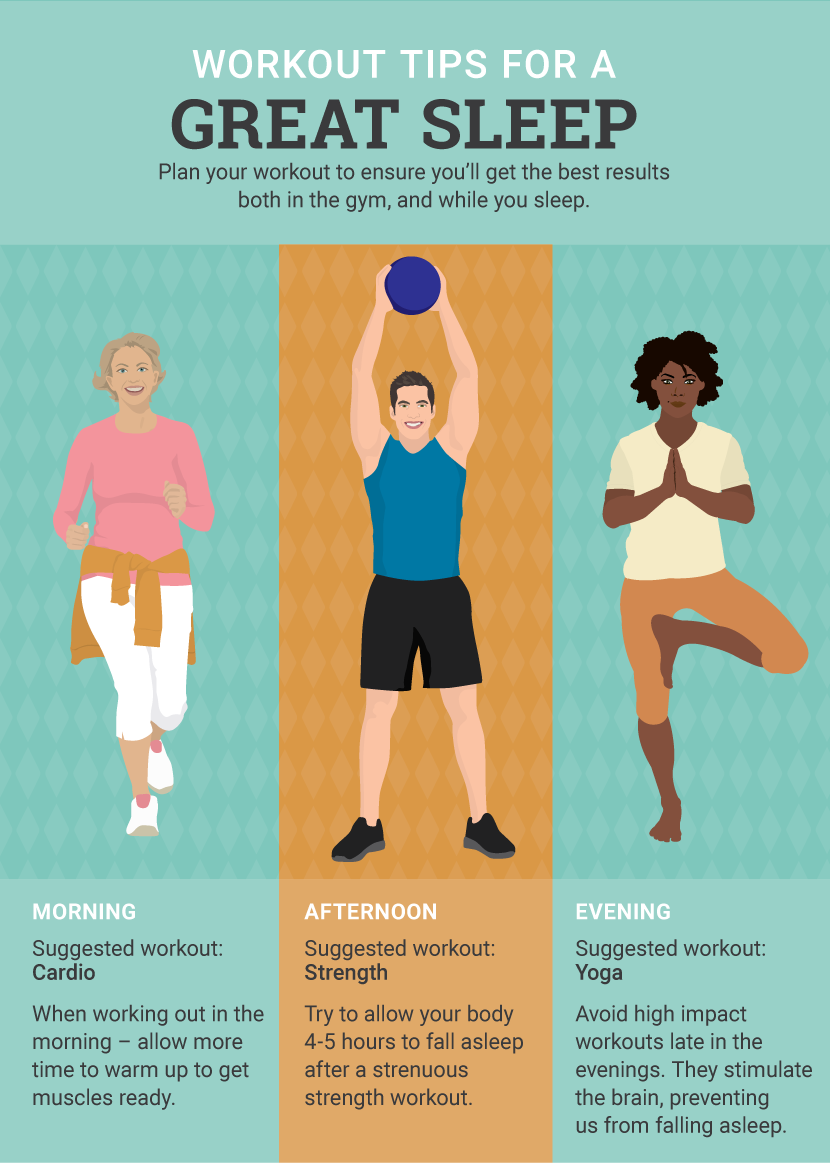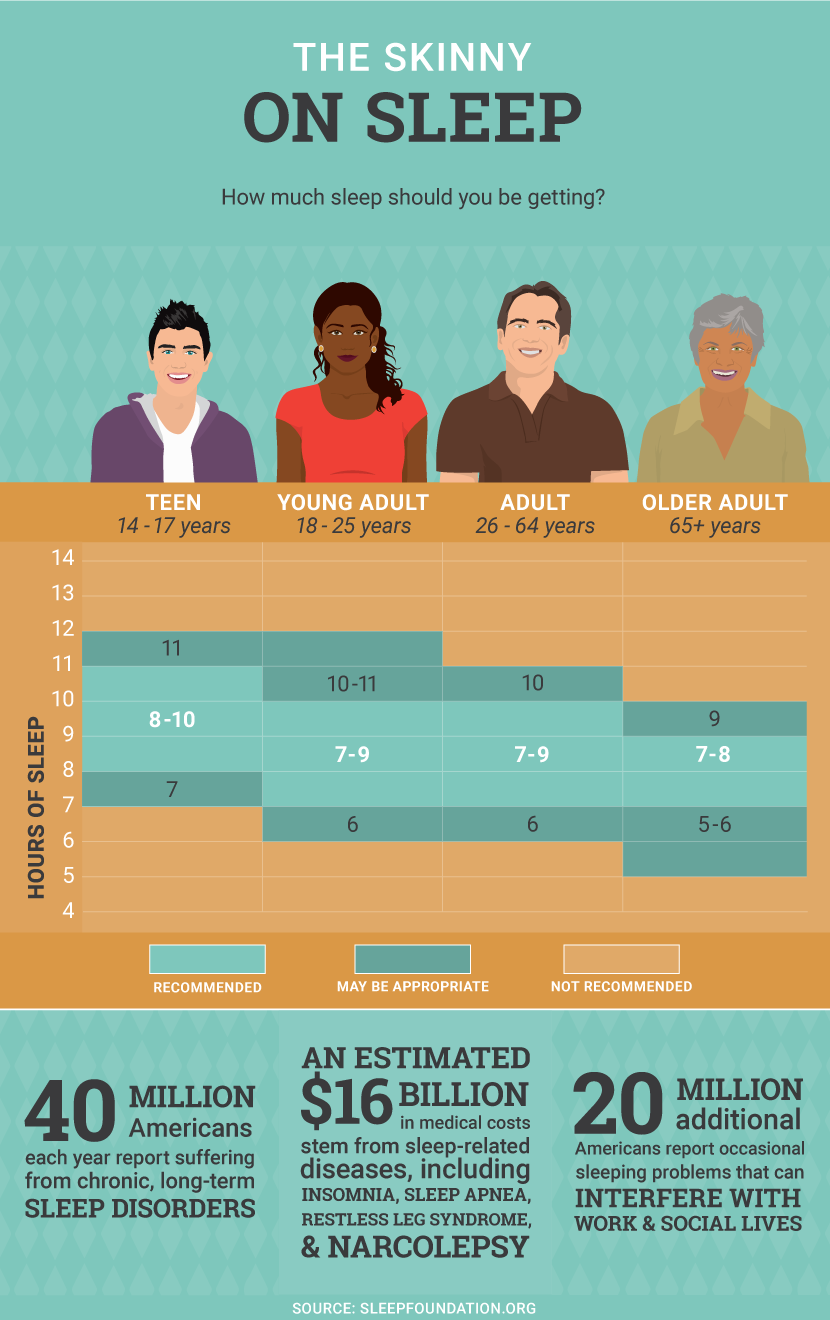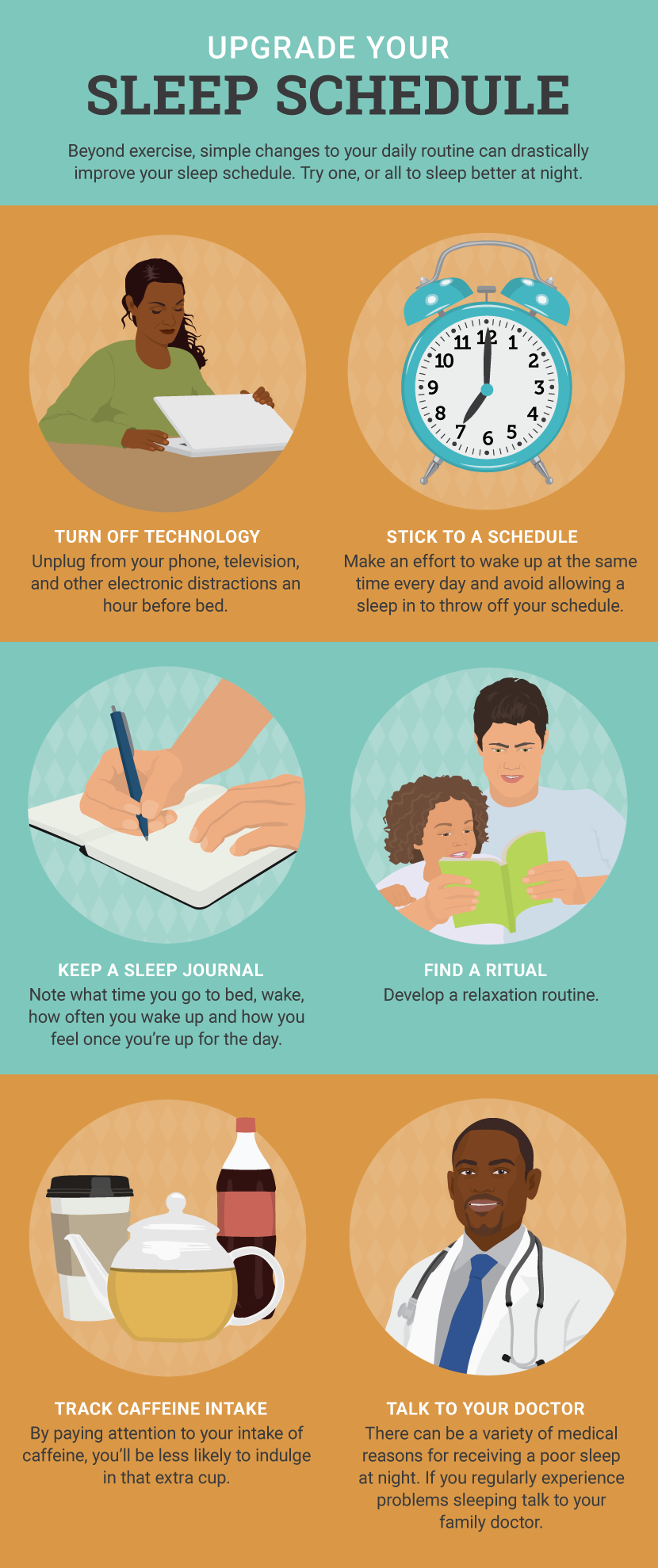Get Fit While You Sleep
Let’s just get something out of the way first: no matter how much and how well we sleep, most of us want and know we need more.
But with a finite number of hours in each day, we’re all struggling to get as much done as possible, and our ideal sleep time is often the first place we steal hours back.
Work follows us home and just one more email means we hit the pillow an hour later than planned. Chores have to get done and maybe that means a much-needed nap gets skipped.
And then comes working out: if you’re like me, the only way to fit in fitness is to rise and shine before the sun! So that alarm starts going off earlier and earlier.
As a fitness instructor and busy working mom, I feel the struggle like so many of you. But I’ve learned – and science backs this up – that sleep and exercise have a symbiotic relationship.
The more you work out, the more quickly you’ll fall asleep when it’s time, and the better that sleep will be.
And vice versa: when you are well-rested, you’re able to perform at top efficiency in your workout, and every minute that you spend sweating gets you closer to your health and wellness goals.
By the same turn, when you don’t sleep, you’re less likely to want to exercise, and that lack of activity can prevent you from falling and staying asleep.
What is so Great About Sleep?
Each year, the National Sleep Foundation does a poll and gives us the state of sleep in America. Year after year, the studies show:
- Exercise reduces stress and tires us out so that we’re able to sleep longer and better.
- Sleep disorders like insomnia, sleep apnea, restless leg syndrome, and narcolepsy cost millions in medical costs and disrupt work and social lives.
- Even when they get the same amount of sleep (an average weeknight is 6 hours and 51 minutes), people who exercise report getting better sleep than those who don’t work out. They’re also much less likely to report sleep problems, including waking up too early or trouble falling asleep in the first place.

When Should we Work Out?
Studies show that exercise in the early morning or afternoon may have a positive effect on what’s known as the “sleep-wake cycle” (our natural circadian rhythm) because it raises body temperature for about 4 to 5 hours and then allows it to gradually fall,
which can help make us feel sleepy a few hours later when it’s time to get to bed.
Plus, warm muscles mean that we’re less likely to get injured during a workout.
It makes sense then, that many sleep experts advise avoiding workouts late in the evening or right before bed –
they can stimulate our brains, which can prevent us from falling to sleep, and that increased body temperature that comes from a good old sweatfest can also keep us revved.
Having said that, every person is different, so it truly comes down to how exercise affects you individually. It’s better to work out at night than not at all, and if you can go right from the treadmill to dreamland, keep it up!
Otherwise, try to end your workout with some light yoga or stretching, or even some meditation to settle your mind down.
And remember: every minute counts cumulatively. If you can take a 10-minute walk in the morning, at lunch, and after work, that’s 30 minutes of activity.
As a trainer, I’d love to see something more vigorous with some weight training and cardio that will get your heart rate up,
but just getting up a few times a day and out of your seat can have a tremendous effect on your overall health and wellness.

How Much Sleep do we Really Need?
Wouldn’t it be great if this was a specific number? Not everyone needs eight hours. Some need more. Many can operate well on less.
And it still comes down to the quality of sleep: in general, it’s better to get fewer hours of deep, interrupted sleep than more sleep that’s restless or broken up.
So, a few tips:
- Assess how you feel. Keep a sleep journal for a week or two, noting what time you go to bed, wake up, how often you wake up, and how you feel once you’re up for the day.
- Check in with your doctor. Are you overweight? Are you experiencing any symptoms of a serious sleep disorder? Are you at risk for any diseases?
- Track your caffeine intake: do you drink it more to stay awake and fight off sleepiness than for the flavor?
- Do you feel sleepy when driving?
There are some general guidelines. The younger you are – infants up through teenagers – the more you likely need (don’t you wish you could still take a midday nap like your kids?).
When you get to young adulthood and up, the suggested sleep range is about 7 to 9 hours, and that may mean that you have to make some sacrifices.
What Can we do in Addition to Exercise to Get a Good Night’s Sleep?
Turn off Technology
The light from our favorite devices actually keeps our brains more active, which makes it harder to shut down and fall asleep
(fun science fact: blue light from the sun has shorter wavelengths that actually tells our brains to be active in the daytime, but when it comes from our smartphones, TV screens, and tablets, our brain doesn’t know how to filter it out).
The light may actually stop melatonin, the sleep-inducing hormone, from working.
Even if you are able to get to sleep, you may find that it’s harder to wake up the next morning and that you feel drowsy for longer.
So if you can, switch to a paper book and turn off all of your devices an hour or so before you want to be asleep.
Stick to a Schedule
Weekends are great for hanging out with friends and socializing, but if you go to bed much later or sleep in later in the morning two days a week, it can be very difficult for your body to adjust.
When possible, stick to the same schedule: go to bed at the same time, wake up at the same time, and follow a regular routine.
Find a Relaxing Ritual
It can be hard to commit to healthy habits, so it’s important that you create and stick to a relaxing pre-bed ritual. Maybe it’s a warm bath, followed by a chapter of your favorite book.
Perhaps you can do a few light stretches before bed or put some meditation guides on as you start to snooze.
I find that drinking a cup of warm mint tea right after dinner helps me signal to my mind and body that the activity of the day is over and it’s time to start settling in.
You know you should exercise and you know you need to sleep. So combine the two and keep them at the top of your health and wellness to-do list.

If you’re overwhelmed, start small. It can take 30 days or more to break a bad habit and build a new healthy one in its place, and with both exercise and sleep, every minute counts.
Start by picking one week where you know you won’t have crazy work deadlines, travel, or other activities that may prevent you from succeeding.
And then instead of worrying about getting three more hours of sleep or a full hour of exercise, make incremental changes.
On day one, can you take a 10-minute walk at lunch and then get to bed 30 minutes earlier than normal? If that goes well, start adding on. Ten minutes can go to 15 minutes and 30 minutes can go to 45.
Also, give yourself a break. We all fall off the wagon. If you have a bad stretch of not exercising and not sleeping well, shake it off and start again.
We’re trying to build sustainable lifestyle changes, not make quick fixes, and if you put too much pressure on yourself, you may get frustrated and quit altogether.
Finally, surround yourself with support. It helps me to tell my husband, “I really want to be in bed by 10 p.m. so I can get up for a run before the kids wake up.”
Then as we get close to that bedtime, he can help me with gentle reminders or even agreeing to come up with me so I don’t feel like I’m in it alone.
If friends ask you to come out late on a Saturday, see if perhaps you could meet for lunch on Sunday instead, so you don’t break your new sleep schedule and routine. Sometimes a public declaration of healthy habit changes helps us stay accountable.
Sweet dreams!
- https://sleepfoundation.org/sites/default/files/2014-NSF-Sleep-in-America-poll-summary-of-findings---FINAL-Updated-3-26-14-.pdf
- https://sleepfoundation.org/media-center/national-sleep-foundation-poll-finds-exercise-key
- https://sleepfoundation.org/sleep-polls-data/sleep-in-america-poll/2014-sleep-in-the-modern-family/
- https://sleepfoundation.org/sites/default/files/RPT336%20Summary%20of%20Findings%2002%2020%202013.pdf
- https://sleep.org/articles/exercise-affects-sleep/
- http://www.ninds.nih.gov/disorders/brain_basics/understanding_sleep.htm
- http://www.journalsleep.org/
- http://blog.nasm.org/fitness/sleep-exercise-connections/
- https://sleepfoundation.org/ask-the-expert/how-does-exercise-help-those-chronic-insomnia
- http://well.blogs.nytimes.com/2013/08/21/how-exercise-can-help-us-sleep-better/
- http://www.huffingtonpost.com/2013/03/04/sleep-exercise-sleep-in-america_n_2784457.html
- http://www.webmd.com/sleep-disorders/news/20141222/tablets-and-e-readers-may-disrupt-your-sleep
- http://www.huffingtonpost.com/2013/03/04/sleep-exercise-sleep-in-america_n_2784457.html
Embed the article on your site

